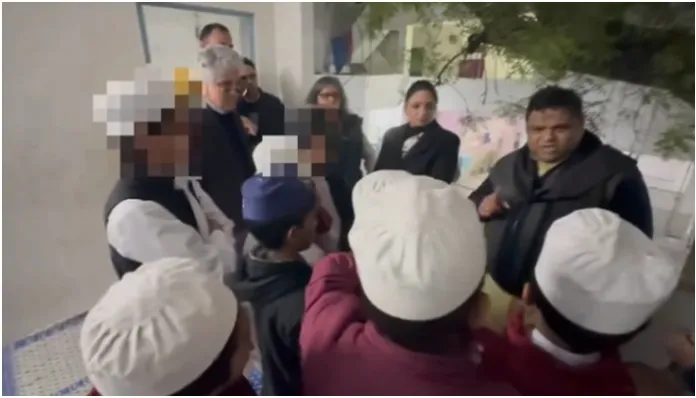The National Commission for Protection of Child Rights (NCPCR) conducted a surprise visit to Madrasa Arabia Faizul Islam in Chandigarh, where shocking revelations of child abuse and grooming surfaced. NCPCR Chairperson Priyank Kanoongo inspected the premises and shared a video of the visit.
During the visit, Kanoongo interacted with children residing in the Madarsa, discovering that three Hindu children visit daily to read the Quran and Qaida. More than a dozen children, including residents from Bihar, Uttar Pradesh, and Himachal, disclosed that around 300 children attend the Madarsa daily for Islamic education.
Alarming findings emerged as the NCPCR revealed that minors in the Madarsa were subjected to physical abuse by authorities, evident from marks on their fingers captured in the video. Kanoongo expressed concern, stating, “Children are being groomed and brainwashed in such a way that instead of becoming doctors or engineers, they want to become muftis.”
आज चंडीगढ़ में मदरसा अरबिया फ़ैजुल इस्लाम का निरीक्षण किया,मदरसे में रहने वाले एक दर्जन से ज़्यादा बच्चे बिहार,उत्तरप्रदेश व हिमाचल के निवासी हैं परंतु यहीं मदरसे में रहते हैं।
लगभग 300 बच्चे दिन में आते हैं शाम को वापिस चले जाते हैं, दिन में थोड़ी बहुत बुनियादी तालीम भी दी जाती… pic.twitter.com/lFzBXgWNJZ— प्रियंक कानूनगो Priyank Kanoongo (@KanoongoPriyank) December 26, 2023
Despite seeking information about the education provided, the NCPCR obtained no details. Kanoongo remarked, “Some basic education is also given during the day, but the administration officials could not give any information about school-related recognition, affiliation, and government permission.”
According to the inspection, the Madarsa appears to focus on grooming children to become muftis, with minimal interest in professions like medicine, engineering, or science. The video showed only a few children expressing interest in becoming doctors or engineers, while the majority aspired to become muftis.
Muftis are Islamic scholars authorized to rule on religious and personal matters, issue legal decisions (fatwas), and provide religious advice. The Madarsa, established in 1991, reportedly lacks government permission to operate as a school and is situated in an urban locality without essential facilities such as a library or computer-aided learning lab.
The NCPCR’s visit on December 26 raised critical questions about child welfare, education standards, and the overall legitimacy of the Madarsa. Authorities are expected to respond to these concerns as the investigation unfolds.




















Comments